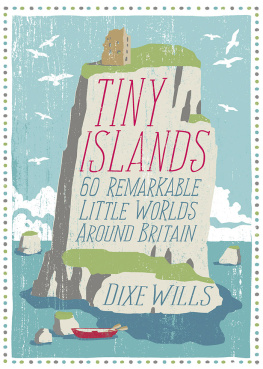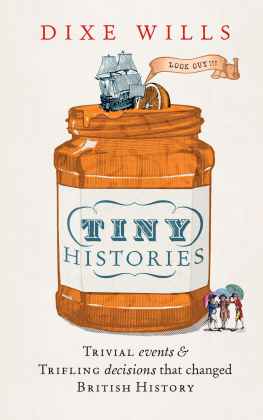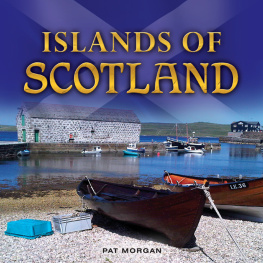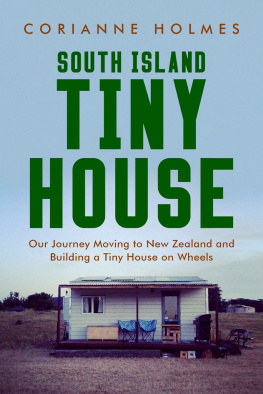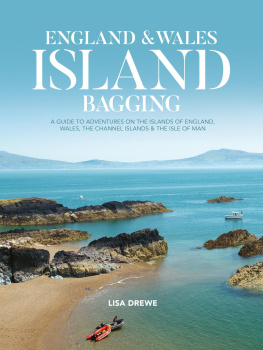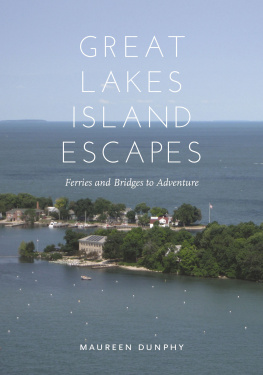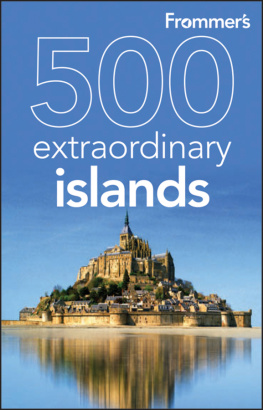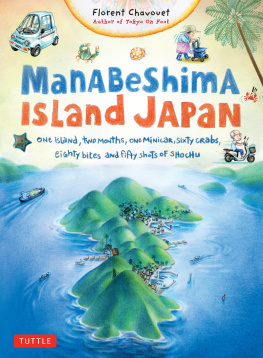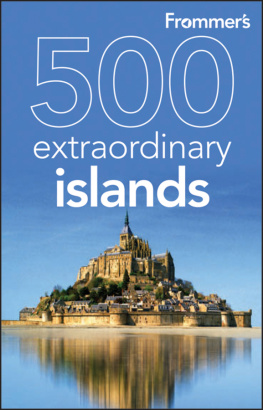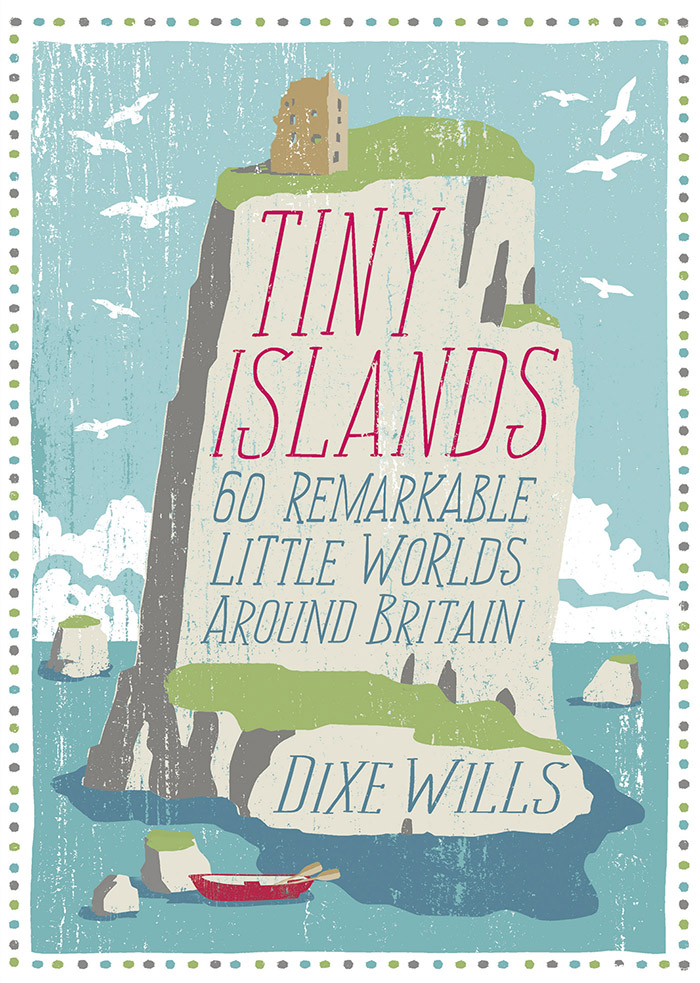
For my parents
Contents

Introduction
Its over there, John said as he pointed across the sea. I looked but all I could see was fog. There, he persisted, you can just make out the outline of the castle. I peered forward, straining my eyes, and, sure enough, a mighty stone keep materialised for a few seconds before vanishing again. Whatever land it was standing on was missing beneath the dense sea fret.
For all I knew, there might be a whole lost world out there full of knights and dragons, and downtrodden serfs gathering around the roaring fire of a venerable inn to warm their calloused hands and talk of insurrection.
Thats Piel Island, John informed me , the scene of the last ever invasion of Britain.
I nodded sagely as if I knew to its most intimate detail the incursion to which he was referring. Whats on it? I asked.
Just the castle, and a handful of houses, he replied, ...and an old pub.
A venerable inn of course, there had to be, I murmured.
And so began my love of tiny islands.
Im not alone in that love. In the course of researching this book, I discovered that Britons have had a yen for tiny islands for thousands of years, and even have an honourable history of building their own. Inuits may have their 23 words for snow, but islands run so deep within our psyche that our various national languages overflow with words to describe them. Theres ait, ayt, eilean, enys, eye, eyet, eyot, eyte, holm, holme, inch, innes, insh, insul, island, isle, islet, ynys and ynysig and no doubt there are others Ive yet to come across.
According to the Ordnance Survey, Britain rejoices in 6,289 islands, of which 803 are large enough for their cartographers to render a coastline on a map the remainder are merely diminutive outcrops. So what were my criteria for choosing just 60? Well, for a start, I decided that for an island to qualify as tiny it should be no larger than 300 acres. That might seem an arbitrary cut-off point (all right, it is an arbitrary cut-off point), but my experience has been that if you visit an island any larger than that it becomes possible at times to forget that its an insular entity at all in the same sense that those of us who wake each morning on mainland Britain dont immediately exclaim: How exciting! Im on an island! As it is, the vast majority of the islands in this book are much smaller than that two-thirds are under 50 acres, of which over half are smaller than 10 (which is a quarter of the size of the gardens at Buckingham Palace).
At the other end of the scale, although rocks that happen to stick out of the water could technically be called islands, I prefer to call these rocks that happen to stick out of the water. When my next book, the ground-breaking Rocks That Happen To Stick Out Of The Water , is published to huge critical acclaim, you can read all about them there.
And then theres the tortuous argument about what does and does not constitute an island. Is an island not an island if its joined to the mainland at low tide? Does a bridge or causeway unisland an island? Frankly, who cares? Life is, after all, brief.
As it turns out, the vast majority of the entries in this book are islands in the classical sense, in that they are surrounded by water at all times and not connected to the mainland. Some others become islands as the tide comes in; a handful can be reached by bridge; while three have permanent causeways built out to them. Happily, whatever their circumstances, every single one of them feels like an island. Youll have to take my word for this, I know, but I wouldnt lie to you. Not about that, anyway.
I applied two other strictures for entry into this book: every island had to be accessible to members of the public, and each one had to have a story to tell and an allure of its own.
Visiting the islands which I did almost exclusively by train and bicycle, the transport combination of the future proved to be not only a joy (albeit a joy occasionally tempered by horizontal rain) but also an education. Who knew that Scotland was once briefly ruled from an obscure island on a river in Galloway; that the behaviour of eels down a well on a Welsh isle could foretell the faithfulness of ones lover; or that a pre-fame Jesus was said to have been dumped on a Cornish island while his great-uncle conducted some business with tin miners?
For such small and, as conventional wisdom would have it, insignificant parcels of land, its astonishing just how much history theyve managed to chalk up between them.
An account of Britains past gleaned only from happenings on these 60 islands would, of course, have some holes in it, but would also give a visitor from Mars a fair idea of the framework of events that have shaped the nation as a whole. To this end, I have compiled a handy so that everyone, whether Martian or not, might be able to appreciate the breadth of experience gained on the islands featured.
I did get out to Piel Island, of course. While there I scraped acquaintance with its king, queen and princess (no, really theyre pukka royals and a lovely family to boot) and when night came I camped in the outer bailey of the castle. It proved, if anything, even more of an enchanted place than I had dared hope.
But then that is the wonder of tiny islands more often than not they over-deliver. Whether reached by jumping off a little ferry onto a crumbling stone pier, by skimming up onto a deserted beach in a canoe, or by striding across a seaweed-spattered causeway built by the Romans, islands imbue their visitors with an immediate sense of escape, of getting away from it all, and the tempting if possibly fanciful notion that if you came to live here you could start your life all over again with a fresh slate.
Of course, some people have made such fantasies reality, and just over a quarter of the 60 islands featured in this book are populated for either a good part of each year or permanently. Now, theres a temptation to suppose that it takes a particular sort of person to reside on a miniature isle. However, we forget that to a great extent most of us contract our lives to the limits of our own tiny island, whether that be a town, village or borough, and spend the greater portion of our time within its boundaries. The only difference for those who live on actual islands is that they usually have to make more of an effort to get to the outside world and thus may need to inculcate a greater degree of resourcefulness and self-reliance. Going by the many islanders I spoke to during my research, this is a small price to pay and island life can indeed be very fulfilling.
Regardless of whether a tiny island is populated, each one is its own miniature kingdom, as often as not ruled over by wildlife, occasionally grazed by sheep or goats, and, if especially blessed, encircled by seals. By existing on a smaller scale, the tiny island affords visitors the pleasure of getting to know it completely. Spend a few hours on one of the particularly diminutive examples and you can familiarise yourself with every lump and crevice. Should you return some day, you come back to an old friend. And despite the profusion of tiny islands in Britain around the coast, on rivers, on lochs and in lakes each one has its own tales, its individual quirks, and its unique view of the world.
I hope that you derive as much enjoyment from visiting the islands in this book as I have done. Indeed, more so, because you wont even have to take notes.
Bestest,

Next page
